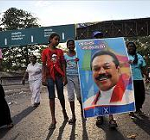“Where do we go from here,” was the headline of an editorial comment in Sri Lanka’s most highly regarded English paper, The Sunday Times last week. It was a question borne out of fear and anxiety. Just months after ending a 30-year old civil war with a decisive victory and after much celebration, the country is once again wracked by uncertainty about the future.
The unease is mainly due to the passing, in Parliament of the 18th Amendment to the constitution, which critics say gives unlimited power to the Executive President. The Executive Presidency has always been a controversial post and in 2005 the current President Mahinda Rajpaksa had said in his manifesto, “I expect to present a Constitution that will propose the abolition of the Executive Presidency and to provide solutions to other issues facing the country.”
Yet last week, the 18th Amendment, which allows the incumbent to stand for elections as many times as he wishes and also removes constraints on his powers was rushed through Parliament. The swift move silence on the part of the main opposition and a ruling by the Supreme Court that there was no need for a referendum and a two-thirds majority voting in its favour in the house was enough. Newspapers have alleged that the President worked out a deal with the Opposition which did not object to the Amendment.
But not only the media but also civil society organisations were sharp in their criticism of this move. The respected Centre for Policy Alternatives in a statement said that the changes sought in the Amendment were “inconsistent with constitutionalism and liberal, democratic values and adversely affect the sovereignty of the people.”
Not only will the Executive president now be free to context the elections as many times as he wants – which could allow him to stay in office for six years a term – but many key powers of independent institutions such as the Election Commission will now be taken away. To many observers, this looks increasingly like a putative dictatorship.
As it is, President Mahinda Rajpakse has been not only abrogating powers to himself but has also appointed close relatives – the defence minister is his own brother – to key positions. Criticism by foreign governments has been rebuffed and opposition at home stifled. A retired army general and war hero who wanted to contest against the President in an election was thrown into jail and a leading journalist who had been critical of the government was mysteriously murdered. A letter by him, which surfaced after his murder, squarely blamed influential people within the government.
What explains this grim turn of events within a year and a half of a much-heralded victory against the brutal Tamil Tigers which finally ended the civil war? The mood after the body of dreaded Tamil Tiger leader Prabhakaran was found was celebratory but soon turned triumphalist. Thousands of Tamils, rescued from LTTE-controlled areas were shepherded into refugee camps and promises were made for quick rehabilitation. Instead, reports began trickling out of gross human rights abuses and suspicions were strengthened when the government refused to allow rights organisations to visit these camps.
Observers noted with alarm the gradual rise of Sinhala chauvinism and the Tamils, who were seen to have “lost” the war – even if all were not supporters of Tamil Tigers – were apprehensive about their place in the post-war nation. Though the government has ensured that there is no violence, the mood is now subdued. Rajpaksa enjoys huge support and has successfully converted that into backing for his controversial proposals, arguing that there is a lot of unfinished work to be done.
Much will depend on how Rajpaksa uses the almost absolute power he has now. A strong opposition could still stymie his efforts to usurp all executive power. That looks unlikely for the time being as the main opposition party is rife with internal dissent. What is more, the president enjoys popular support as the architect of the military victory. The bigger question, which should concern India is, what does this mean for the Tamil minority of the island, which now has almost no one with legitimacy to argue for its rights. After winning the war, Sri Lanka now may end up losing the peace.
Sidharth Bhatia is a freelance journalist and writer.
This article was exclusively written for Gateway House: Indian Council on Global Relations. You can read more exclusive content here.
For interview requests with the author, or for permission to republish, please contact outreach@gatewayhouse.in.
© Copyright 2010 Gateway House: Indian Council on Global Relations. All rights reserved. Any unauthorized copying or reproduction is strictly prohibited.


